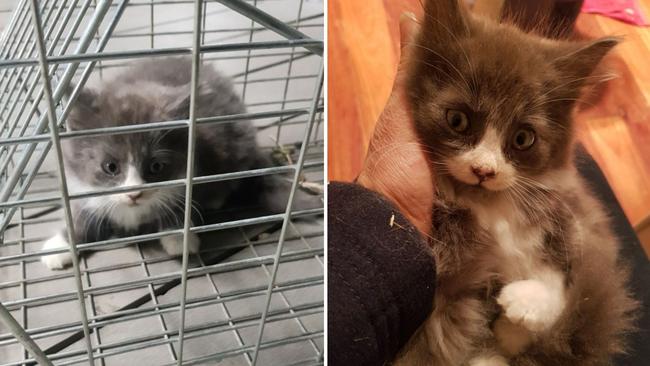‘Endless stream of kittens’: Animal Welfare League launches new initiative for Ipswich’s stray cat problem
A cat rescuer, who once found a litter of persian kittens dumped in a drain, has exposed the tragic circumstances facing unwanted felines in South East Queensland, as a new initiative launches to help stray cat carers.
Ipswich
Don't miss out on the headlines from Ipswich. Followed categories will be added to My News.
Ipswich cat-trappers say they are working overtime – and out of their own pocket – to rehabilitate strays, but the Animal Welfare League of Queensland’s new initiative may offer them some relief.
Ipswich resident Lisa Hickey has been saving kittens for years now by trapping them, socialising them, and passing them on to shelters for rehoming.
She was working as a relief teacher at a school in Ipswich when she looked out the window and saw a little ginger kitten – and was told that the school had a stray cat problem.
“A lot of lost cats will gravitate to places like schools because there’s food left around and there’s lots of nooks and crannies where they can hang out,” Ms Hickey explained.
She developed an arrangement with the school cleaners, and now helps them by trapping the kittens.
“It seems there’s an endless stream of kittens,” she said.

The Animal Welfare League of Queensland (AWLQ) announced a new initiative just last week to help the Ipswich community with its stray cat problem.
They’re looking for people who care about cats and wildlife to volunteer as part of the new Cat Assistance Team (CAT) program, piloted exclusively in the Ipswich community.
Ms Hickey said that trapping kittens was a time-consuming and difficult job, as it required knowledge of where the cats are likely to be – and she often still comes up empty-handed.
“I maybe trap about 10 a year, and they get to have a much better life than the very short brutal life that they would have just living wild,” she said.
One kitten Ms Hickey caught died shortly after she found it as it had a serious eye injury, and she once found a whole litter of Persian kittens in a drain.
“Some of the kittens I’ve caught have been so undernourished and thin, and clearly their mother’s have just abandoned them,” she said.
Ms Hickey said she generally kept the kittens for a month or so to socialise them, before passing them on to a shelter.
“If they have terrible skills and they just attack and hiss, there’s not much that some shelters will do; other shelters will farm them out to their own support network.”
She also said she mostly trapped kittens, as shelters often did not take in older stray cats because domesticating them can take years, and most people prefer to adopt kittens.
The one setback was s that the kittens need to be desexed before they could be adopted – which is an expensive process, and the kittens needed to be a certain age before they could safely undergo the procedure.
Ms Hickey said she’d worked with shelters who had tried voucher systems in the past which would allow people to take kittens home then come back to desex them, but that it rarely worked because people often would not come back — and the cat population would continue to grow.

A Toowoomba resident, who goes by Miss C, has put calls out for financial aid in the Ipswich and Toowoomba communities because of the expenses she had racked up by taking in their strays.
She’s only allowed two cats at her rental but is currently housing seven strays in addition to her own cats — one of which just gave birth to a litter of kittens.
“I want to give as many kittens — as many cats actually — a chance of having a second home,” she said.
She said people did not realise the cost of having a pet when they took them in, and were sometimes forced to dump them because of the financial cost.
“They’re dumped in plastic bags, they’re dumped in rivers, they’re dumped out by the paddocks, they’re dumped on the side of the road,” she said.
Miss C said she has been struggling to find shelters to take in the cats because they were so full and that she chose not to deal with certain shelters if they did not spay cats or only took kittens.
“There’s so many rescues out there that don’t want to deal with strays; they just want to put them down and keep the kittens,” she said.
She’s now having difficulty finding her cats new homes — and it was incurring a hefty cost.
“I’m paying for the food, I’m paying for the vet bills, for the medication – all that sort of stuff,” she said.
“I’ve got people that are wanting the kittens but I’m saying to them, they’re not going until they’re spayed.”
The two rescues she said have been a huge help to her were Street Cat Alliance and Country Cat Rescue.

AWLQ’s new program will help find owners of stray cats and offer support with desexing and microchipping, transport to vet clinics, ways to keep cats on their property and allow people to keep wandering cats off their property.
The Cat Assistance Team will also be available to provide assistance with cat food, vet support and emergency boarding.
Dr Joy Verrinder, AWLQ’s Strategic Director, said they “plan to work with the community to find better ways of preventing [cats wandering], rather than trapping and impounding cats.”
“We have worked with the City of Ipswich Animal Management Department to develop this new initiative to reduce cat issues and oversupply of cats that the officers, rehoming staff and volunteers, and rescue groups are trying to manage each year,” said Dr Verrinder.
Anyone interested in volunteering with the new C.A.T. Program can complete an Expression of Interest Form by visiting www.awlqld.com.au/volunteer-cat-assistance-team or emailing ipscommunitysupport@awlqld.com.au.




